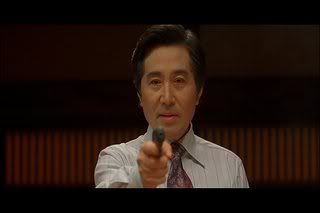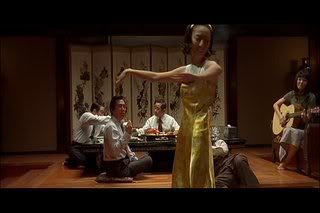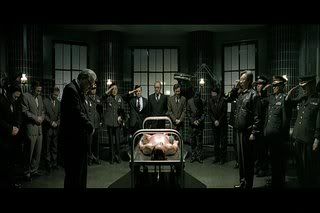
On October 26th, 1979, South Korea's President, Park Chung-hee, was assassinated by the Director of the Korean Central Intelligence Agency (KCIA), Kim Jaegyu. The President's Last Bang by Im Sang-Soo focuses on the immediate lead-up to the assassination, and the chaotic hours that directly followed.
Park Chung-hee had come to power in 1961 through a military coup. Despite these dubious beginnings, Park managed to strengthen South Korea's flagging economy, by implementing five year plans and normalizing relations with Japan. Unfortunately, the longer he stayed in office, the more despotic his rule was. Park became withdrawn, and his government more repressive. Apparently (or, at least, according to Wikipedia), when on trial for Park's assassination, Kim Jaegyu stated "I did that for democracy of this country. Nothing more, nothing less."

The President's Last Bang doesn't make Kim's motivations so clear. Im portrays Kim (played by Suk-kyu Han) as a burned out and frazzled bureaucrat, suffering from constipation and chronic halitosis. His decision to murder Park seems almost spur-of-the-moment, and primarily inspired by his dislike for Park's bodyguard, Cha Ji-cheol. During a dinner engagement with the President and Chief Secretary Yang (Park's toadying drinking buddy), Kim is forced to endure Cha's boorish manners and draconian political advice. After becoming angered with Cha, Kim steps outside to tell two of his friends from the KCIA that he's going to kill Cha and Park, and that they'd better be ready to back him up. Clearly this is something they've contemplated before, but his friends' reactions betray the fact that they had no idea it was coming that night.
What follows is an extended spat of graphic violence, during which Kim shoots Cha and Park, only to have his gun jam, so that he has to leave the room, find another weapon, and return to finish them off. As soon as the gunshots are heard, the two other KCIA men ambush Park's guards, gunning them down before they have a chance to react.
Im shows us the immediate consequences of the assassination as a comedy of errors: the President's bodyguards carry empty guns; there's no communication between the various arms of South Korea's government; when the Cabinet Council meets to discuss what's to be done, they discover that none of them really know; and a soldier guarding the army headquarters even refuses to let one of the characters in, failing to recognize him as the army Chief of Staff. While Kim never declares himself the assassin, he acts, in the aftermath of the killing, without fear, as though he thinks that the South Korean government is too obtuse or impotent to do anything about it.

The President's Last Bang is intended for a Korean audience, one that is acquainted with the historical event. As such, a Western viewer is left to find his or her own footing--which, admittedly, took me upwards of twenty or thirty minutes, as I tried to map out in my mind the characters and how they were all related. Luckily, there is some background information given at the start of the film, in the form of subtitles that I can only assume were added by KINO, since there is no accompanying Korean text on the screen.
The KINO DVD provides a few extras, and the subtitles seem accurate and easy to read. The transfer isn't perfect--there's some combing evident, but that only really showed up when I paused the film (or took some screen captures). Im has a real sense of visual flair, making The President's Last Bang an eye-catching film. Most impressive is Im's capacity to combine styles, so that this historical biopic features gritty, gangster-style violence and satirical laughs in equal measure. Basically, it's pretty fucking cool. Recommended for fans of foreign features, who'd like to see something a little different on their TV screen.










No comments:
Post a Comment